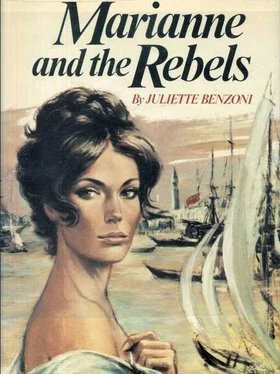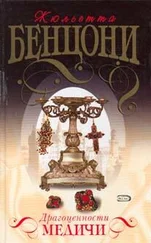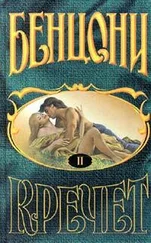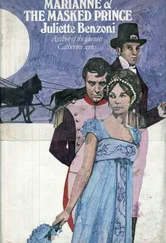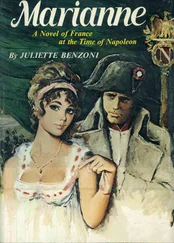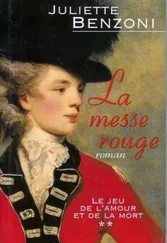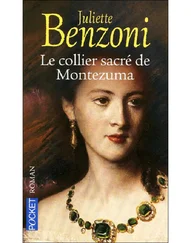Juliette Benzoni
Marianne and the Rebels
CHAPTER ONE
Florentine Spring
Gazing at Florence, spread out in the sun in its nest of soft grey-green hills, Marianne asked herself why it was that this city drew her and yet irritated her at the same time. From where she stood, she could see only a part of it, framed between the dark spire of a cypress and the rose-coloured bank of laurels, but this fragment of the city hoarded beauty as a miser hoards gold: provided only there was enough of it.
Beyond the long gold streak of the Arno, spanned by the bridges that seemed almost on the point of collapsing under their burden of medieval shops, was a huddle of old-rose tiles tossed at random on a background of warm ochre-coloured, pale grey or milky-white walls. Here and there a special jewel emerged: the Duomo, a coral bubble poised on a guttering, inlaid ground; a half-open lily, frozen for ever in silvery stone on the old Palazzo della Signoria, plain, square towers blossoming into crenellations like so many butterflies, and campaniles gay as Easter candles in many-coloured marbles. More often than not, this beauty soared in a random way out of some dark and twisted alley, between the blank wall of a palazzo, double-locked like a strong-box, and a peeling, malodorous slum. And sometimes the stonework was breached by a scented riot pouring from an overgrown garden which no one had had sufficient bad taste to prune.
Florence lay warming its old gold and tarnished embroideries in the sun, basking under a sky of indigo in which a single small white cloud floated aimlessly, as if the future had no meaning for it and it had forgotten the inexorable passage of time; content only to feed its dreams upon the past.
It may have been something of this aspect of Florence that caught an element of Marianne's own nature on the raw. To her the past was important only in so far as it affected the present, and in the ominous shadow it cast over her future, that vague, almost impenetrable future towards which she was straining with her whole being.
True, she could have wished to share this moment, lulled by the beauty of the garden all around her, to share this fleeting moment with the man she loved. What woman would not? But two long months were yet to pass before she could meet Jason Beaufort in Venice, where his ship was to cast anchor in the lagoon, according to the promise made between them on that strangest and most tragic of all Christmas nights. Always supposing that they would ever meet again, for between Marianne and that meeting of her life stood the dread shadow of her unseen husband, Prince Corrado Sant'Anna, and the unavoidable, possibly even dangerous explanation which she owed him, and which she would have to cope with before long.
In a few hours' time, she must leave Florence and the comparative safety it had offered her and continue her journey to the white palazzo whose gentle, singing fountains had no power to exorcise its evil ghosts.
What would happen then? What compensation would the masked prince exact from one who had failed in her part of the bargain, to bring him the child of the imperial blood, the hope of which had prompted the marriage? What compensation… or what punishment?
For it was true, wasn't it, that for several generations the Sant'Anna princesses had come to evil ends?
In the hope of making sure of the best possible counsel for her defence, the most understanding and also the best informed, she had written, immediately on arrival in Florence, to her godfather, Gauthier de Chazay, Cardinal San Lorenzo with an urgent appeal for help, and dispatched it by a messenger. Gauthier was the man who had married her to the Prince in such strange circumstances, thinking to ensure a more than enviable life for her and for her child, while at the same time obtaining for a wretched, self-condemned hermit the heirs he either could not or would not produce for himself. It seemed to Marianne that the little cardinal was the best person to unravel a situation which had become worse than tragic and to find some acceptable solution.
But after several days' wait, the messenger had returned empty-handed. He had not found it easy to make contact with the restricted entourage of the Pope, whom Napoleon's men hardly allowed out of their sight, and the news he brought back was disappointing: Cardinal San Lorenzo was not at Savona and no one knew where he could be found.
Marianne had been disappointed, naturally, but not otherwise surprised. Ever since she had been old enough to understand, she had known that her godfather spent most of his time travelling mysteriously in the service of the Church, one of whose most active secret agents he appeared to be, or else for the exiled King Louis XVIII. He might now be at the ends of the earth, with nothing further from his mind than the fresh troubles besetting his goddaughter. She must get used to the idea that this hope had failed her.
The days to come, then, were not without their promise of clouds, Marianne reflected with a sigh: far from it. Yet she had long known that the generous gifts which fate had bestowed on her birth – beauty, charm, intelligence, courage – were not given for nothing, but were weapons with whose aid she might yet succeed in winning happiness. It remained to be seen if the price would be too heavy to pay…
'What have you decided, my lady?' The well-bred, courteous voice held an impatience ill-concealed.
Roused from her wistful reverie, Marianne shifted the pink sunshade that was supposed to protect her delicate complexion from the heat of the sun and lifted to Lieutenant Benielli an abstracted gaze which yet held a disquieting green glint of anger.
God what a bore the man was! In the six weeks since she had left Paris with the military escort under his command, Angelo Benielli had dogged her footsteps unmercifully.
He was a Corsican: stubborn, vindictive, jealous of the least bit of his authority, and possessed, besides, of a most unamiable character. Lieutenant Benielli admired only three people in the world: the Emperor, of course (and all the more so because they were compatriots); General Horace Sebastiani, because he hailed from the same village; and a third soldier, also a native of the Beautiful Isle, the General the Duke of Padua, Jean-Thomas Arrighi de Canova, because they were cousins and also because he was a genuine hero. Apart from these three, Benielli had scant regard for any of the great names of the imperial armies, even for Ney, Murat, Davout, Berthier or Poniatowski. The basis of this indifference was the fact that none of these marshals had the honour to be Corsicans, an unfortunate but, in Benielli's view, disqualifying fault.
It went without saying, in the circumstances, that the duty of acting escort to a woman, even a princess ravishingly lovely and honoured with the especial regard of his Majesty the Emperor and King, was to Benielli nothing more than a tiresome chore.
With the fine frankness which constituted the most delightful side of his character, he had let her understand as much before they reached the Corbeil stage, and from that moment the Princess Sant'Anna had begun seriously to wonder if she were an ambassadress or a prisoner. Angelo Benielli watched her like a law officer pursuing a pickpocket, arranged everything, decided everything from the length of the stages to the room she occupied at the inns (there was a soldier on guard outside her door each night), and might almost have required to be consulted on her choice of dress.
This state of affairs had not failed to provoke the antagonism of Arcadius de Jolival, who was not remarkable for patience at the best of times. The evenings on the early part of the journey had been punctuated by a series of verbal duels between the Vicomte and the officer. But Jolival's best arguments only came up against the single principle on which Benielli took his stand: it was his duty to watch over the Princess Sant'Anna until a certain date fixed in advance by the Emperor himself, and to do so in such a way that not the slightest accident of any kind should befall her. To this end he meant to take all necessary precautions. Beyond that there was nothing to be got out of him.
Читать дальше
